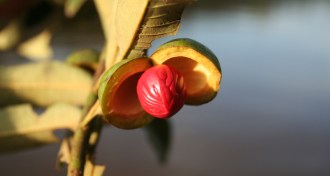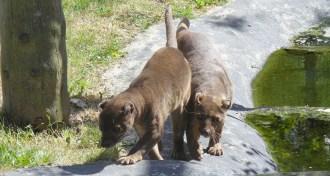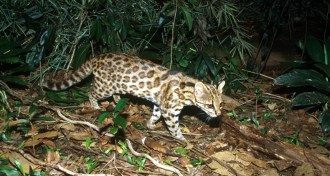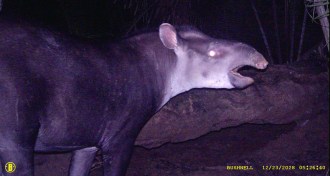Search Results for: Forests
Skip to resultsCan’t find what you’re looking for? Visit our FAQ page.
5,531 results for: Forests
-
 Animals
AnimalsOut of the Jungle: New lemurs found in Madagascar’s forests
Two new species of lemur have been discovered in Madagascar, the only home of these tiny and endangered primates.
-
 Materials Science
Materials ScienceFine Fabric: New, fast way to make sheets of nanotubes
Scientists have come up with a way to efficiently produce thin, transparent sheets of carbon nanotubes that are several meters long.
By Sid Perkins -
 Animals
AnimalsWhen a chipmunk teases a rattlesnake
Several of the Northeast's least ferocious forest creatures taunt rattlesnakes.
By Susan Milius -
 Plants
PlantsJust a few tree species dominate Amazon forest
The Amazonian rainforest, known to be one of the most species-rich areas on the planet, is actually dominated by a only few tree species.
By Science News -

Scicurious arrives!
Blogger Bethany Brookshire has joined Science News as its science education writer. With her expertise she brings her popular blog Scicurious to SN.
-
 Animals
AnimalsThe bromance of the fossas
Male fossas, mammal carnivores native to Madagascar, hang out with other males to boost their hunting and mating success.
-
 Animals
AnimalsDNA study reveals new wild cat species in Brazil
A new small cat species, Leopardus guttulus, was discovered in Brazil, hiding in plain sight. The oncilla, researchers say, is really two kinds of cat.
-
 Animals
AnimalsNew species of tapir found in the Amazon
A sixth species of the large, snouted mammal was hiding in plain sight, well known by indigenous people.
-
 Health & Medicine
Health & MedicineAge-related anemia hastens death
People who develop low concentrations of iron-containing hemoglobin in their blood as they get older are at elevated risk for serious medical problems and early death.
By Ben Harder -
 Earth
EarthWarming climate may slam many species
Expected increases in global temperature could eradicate from a sixth to a half of the plant and animal species across large areas of the globe, a new analysis suggests.
By Sid Perkins -
 Paleontology
PaleontologyAncient wood points to arctic greenhouse
Chemical analyses of wood that grew in an ancient arctic forest suggest that the air there once was about twice as humid as it is now.
By Sid Perkins -
 Materials Science
Materials ScienceMelt-Resistant Metals: Carbon coating keeps atoms in order
Shrink-wrapped in carbon, nanoscale metal chunks melt at extraordinarily high temperatures, suggesting carbon coatings as a route to higher heat resistance for materials and devices.
By Peter Weiss